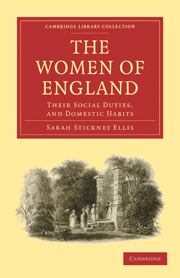Summary
The higher admiration we bestow upon the nature and attributes of any subject of contemplation, the more painful and acute is our perception of its defects. And thus when we think of woman in her most elevated character, consider the extent of her capabilities, and her wonderful and almost unfailing power of being great on great occasions, we are the more disposed to regret that she has a power equally unlimited, of making herself little; and that, when indolence or selfishness is allowed to prevail over her better feelings, this power is often exercised to the annoyance of society, and to her own disgrace.
Those who understand the construction of woman's mind, however, will find some excuse for this, in the natural versatility of her mental faculties, in the multiplicity of her floating ideas, in the play of her fancy, and in the constant overflow of her feelings, which must expend themselves upon some object, either worthy or unworthy; and which consequently demand the utmost attention to what is really important, in order that this waste of energy, of feeling, and emotion, may be avoided.
The word caprice, in its familiar acceptation, is one of very indefinite signification. I shall endeavour to confine my use of it to those cases in which the whim of the moment is made the rule of action, without any reference to right reason, or even to the gratification or annoyance of others; and I shall endeavour to show, that with regard to this feminine fault, as well as many others, women are not fairly dealt with by society.
- Type
- Chapter
- Information
- The Women of EnglandTheir Social Duties, and Domestic Habits, pp. 276 - 297Publisher: Cambridge University PressPrint publication year: 2010First published in: 1839

